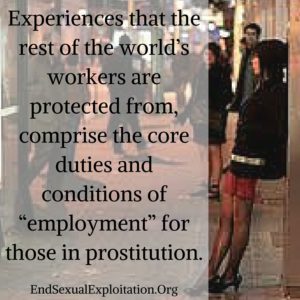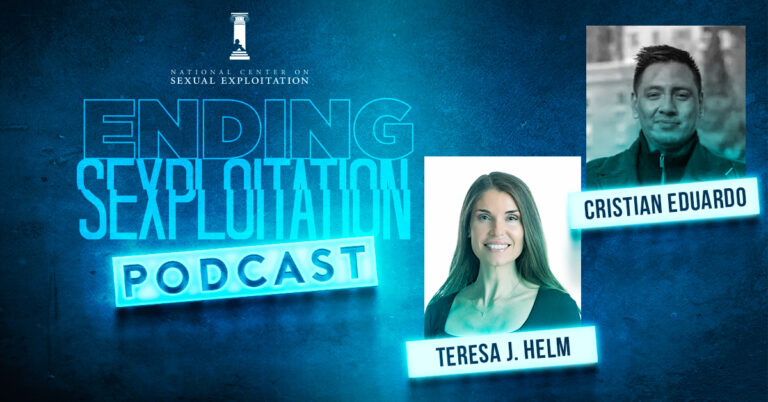Argument #1: Prostitution is sex work.
Response: “Sexual exploitation is nobody’s ‘job.’”
Several years ago the advocacy group Women Hurt in Systems of Prostitution (WHISPER) developed a powerful tool that communicated the extent of the harms experienced by persons in prostitution. Just what was this tool? Answer: a “job” description.
Few things undermine the myth of “sex work” like a detailed list of exactly what people caught up in the sex trade are expected to do night after night, day after day, month after month, year after long, miserable, interminable year. For those readers of stout mind and heart, you can read that “job” description here. However, for those who are triggered by depictions of sexual abuse and violence, do yourself a favor and skip the link. We’ll try to convey WHISPER’s message more delicately in what follows, but understand that there is nothing delicate or tender about the sex of prostitution.
At the heart of the debate about decriminalization of prostitution (by this we mean the removal of laws against prostitution, the removal of which infer a right for persons to barter and trade other persons for sexual consumption) is what one believes about work, and what one believes about human worth and dignity.
While there are several meanings ascribed to the term, for the purpose of this discussion work should be understood as the labor, task, or duty that is one’s means of livelihood. For most people work is a necessary part of ensuring one’s survival: we work as the means to earn our wages and to sustain ourselves and those we love. For some, work may be a drudgery, a toil to be endured; for others, it may be a passion—a lifelong pursuit of one’s deepest interests and aspirations. From banking, engineering, janitorial service, the insurance industry, food service, education, medical professions, agriculture, journalism, law enforcement, aviation, to horticulture and beyond, there are a myriad of occupations in which one may work.
But this work is typically pursued within parameters. As a society we recognize that work should be performed within certain boundaries, and thus create rules concerning how it is carried out, such as the number of hours and days per week one must work, the number of sick days granted, and the minimum wages one can be paid. We also define certain conditions in which the work must be carried out—for instance, mitigating the risk of injuries due to environmental hazards, and prohibiting certain activities such as smoking or drug use in the workplace, as well as racial discrimination and sexual harassment.
It hasn’t always been this way. Current labor conditions in the United States are the result of generations of reforms (and even a civil war which resulted in a constitutional prohibition of slavery). And, while the current American labor context is no panacea, in many parts of the world others dream of working under the rights and protections ascribed to American workers.
But whether one lives and works in the United States, Germany, the United Kingdom, Japan, Brazil, Italy, Syria, Nigeria, Sierra Leone, Thailand, or anywhere else on the planet, what does it mean if one’s livelihood by means of prostitution is a normalized form of work?
It means that that your daily existence will likely entail:

- others will have a “right” to profit from the sale of your body;
- others will have a “right” to sexually access your body as long as they paid to do so (and even if they don’t);
- sexual harassment, assault, and rape are “on the job” requirements;
- law enforcement will look the other way, as no “crimes” have been committed;
- the public will at best turn a blind eye to your plight, or at worst mock your abuse by calling it “your job.”
Thus, experiences that the rest of the world’s workers are protected from (or at a minimum, most rational members of society believe they should be protected from), comprise the core duties and conditions of “employment” for those in prostitution. Some job.
At NCOSE we recognize that many (if not the overwhelming majority) of persons in prostitution around the world have turned to prostitution not because it’s a fantastic experience and they love the “benefits,” but because they were groomed for it, sold into it, can’t escape it, or have no other means to support themselves.
But whatever the circumstances by which they became entangled in the sex trade, we believe people deserve better than prostitution. We believe sexual exploitation is nobody’s “job.”
[1] See the NCOSE fact sheet on physical and sexual violence in prostitution for studies and citations.


